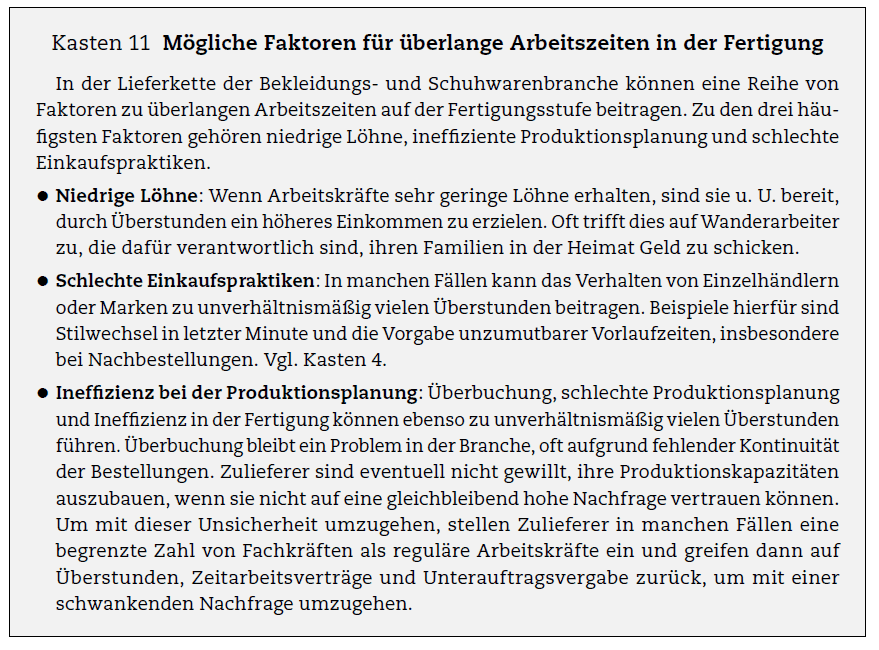Working Hours
The International Labour Organization (ILO) states that a standard working week in industry should not normally exceed 48 hours, spread over six working days, excluding overtime. Including overtime, workers should not have to work more than 60 hours in a seven-day period. However, excessive overtime is common throughout the garment and footwear value chain. The OECD guidance on the garment sec-tor (p. 131) states:
“For many enterprises operating in the garment and footwear supply chain, the highest risk of excessive overtime is found at garment and footwear manufacturing. While some countries may hold higher risks than others, excessive overtime is prevalent across most sourcing countries. Excessive overtime may be increased where there are high rates of migrant work-ers employed in the sector, however, this indicator should not be used alone to determine high-risk contexts for excessive overtime.“
The Fair Wear Foundation analysed the working hoursin Bangladesh within a study . 2012 and 2015in 97 percent of the 36 analysed excessive overtime found in garment factories. Zwei zusätzliche Stunden pro Tag und 60-Stunden-Wochen waren üblich. Auch die Studie „Working hours in the global garment industryalso points to a range of different thresholds (and their exceedance) for normal working hours, overtime and overtime premium, as well as different annual holidays and public holidays.
What solutions are there to regulate working hours?
Collective bargaining and collective agreements are a tool to achieve good working condi-tions. Purchasing practices are also an important lever for progress towards good working conditions and living wages. Therefore, companies should only work with suppliers and facto-ries that commit to the recommended working hours. For example, companies should stipu-late in their contracts that overtime is voluntary and will be paid at a higher rate. Finally, they should commit to higher wages across the industry so that workers earn a living wage in nor-mal, regular working hours.
The Textiles Partnership has formulated social goals that all members recognize by joining the Partnership. These goals are based on international social standards, in particular the ILO Conventions, the UN Guiding Principles on Business and Human Rights and the OECD Guidelines for Multinational Enterprises. With regard to working hours, the Partnership goals are as follows:
“Companies must keep to working hours which comply with national legislation, or applicable collective bargaining agreements. The rule followed must provide the greatest possible pro-tection for the health, safety and wellbeing of employees. The working week must not exceed a maximum of 48 hours (not including overtime), with the exception of the exceptions recog-nised by the ILO. In the case of piece work, a production target must be set which ensures compliance with the working hours defined above.
Overtime must not be worked on a regular basis, and total working hours must not exceed 60 hours per week.
There must be adequate breaks in the course of work. Companies must also respect the right of all employees to at least one work-free day after 6 consecutive working days and the right to public and/or religious holidays and to annual leave. Companies must respect the right of employees to leave the company premises at the end of their regular working hours.”
Working hours are one of the eleven sector risks that Partnership companies focus on in the review process. Based on the analysis and prioritisation of the risk, companies define targets and actions to address their most serious risks.
Purchasing practices have already been mentioned as an important tool. They also play an important role in the work of the Textiles Partnership:
- annual topic 2021
- Partnership Initiative on Living Wages
- Sector risk of wages and social security
- Evaluation of the Purchasing Practices Self-Assessment
In addition, the Textiles Partnership cooperates with the initiative Action Collaboration Transformation (ACT) to advance living wages and collective agreements in the textile and garment industry.
Further information and tools:
Common Objective: The Issues: Working Hours (2018).
OECD: OECD Due Diligence Guidance for Responsible Supply Chains in the Garment & Footwear Sector (2020). Modul 4 about Working Hours



